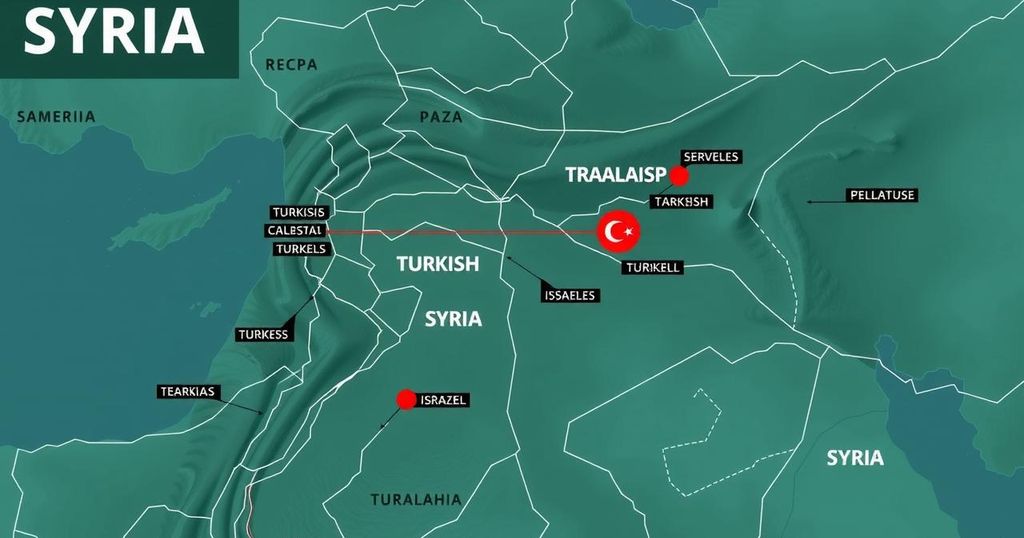Syria After al-Assad: Competing Visions of Turkish and Israeli Influence

The ousting of President Bashar al-Assad in December 2024 marks a critical phase in Syria’s history, prompting influential roles for Turkiye and Israel amidst shifting regional dynamics. Turkiye pursues military operations against Kurdish forces to secure its border, while Israel ramps up efforts to neutralize Iranian and Hezbollah threats. The new Syrian administration must navigate complex relations with both powers to foster stability and economic recovery.
The departure of President Bashar al-Assad on December 8, 2024, signifies a pivotal moment in Syria’s history, paving the way for a shift molded by changing regional dynamics. As Turkiye and Israel aim to assert their influence, their contrasting agendas are reshaping Syria’s future and affecting broader Middle Eastern stability with lasting consequences.
Since the Syrian civil war erupted in 2011, Turkiye has significantly influenced the conflict’s trajectory. Initially, Ankara allied with factions opposed to al-Assad, notably the Hayat Tahrir al-Sham (HTS), but its focus shifted towards preventing a Kurdish entity along its border, which it considers a grave security concern. Turkiye intensified military operations in northern Syria, targeting Kurdish groups and creating buffer zones to protect its territory, exemplified by the December 2024 Manbij offensive which reclaimed territory from the Syrian Democratic Forces (SDF).
Turkiye’s proactive military strategy includes more than 10,000 troops stationed along Syria’s northern border, the construction of at least five new military outposts, and the resettlement of over 30,000 Syrian Arab families to alter the demographic landscape in its favor. The Turkish government has invested approximately $2 billion into infrastructure projects, evidencing its commitment to maintaining a foothold in the region. Additionally, Turkiye is reportedly restructuring the Syrian military to align with its interests and is contemplating the establishment of permanent military facilities in Syria, illustrating its long-term ambitions.
Conversely, Israel’s strategy has centered on countering Iranian and Hezbollah influences within Syria. Following al-Assad’s potential removal, Israeli military operations escalated, particularly airstrikes targeting Iranian positions and Hezbollah troops to mitigate any threats near the Golan Heights. Between December 2024 and March 2025, the Israeli Air Force executed over 80 strikes, asserting that their actions have significantly weakened Hezbollah’s operational capabilities and logistical networks.
President Ahmed al-Sharaa now confronts the challenge of navigating relations with both Turkiye and Israel, overseeing the intricacies of their conflicting interests in Syria’s future. While managing Turkiye’s expanding military presence raises sovereignty concerns for Damascus, there is a necessity for pragmatic dialogue to foster stability and recovery. Efforts to negotiate on Turkish military outposts have been initiated, yet uncertainty surrounds the outcomes due to the similar lack of agreement on significant issues.
Al-Sharaa’s administration appears more pragmatic towards Israel compared to the previous regime’s close ties with Iran. Although there has been no formal diplomatic engagement, reports suggest backchannel communications have been initiated, indicating a potential shift in strategy. However, Israel maintains a firm stance on eliminating Iranian military infrastructure in Syria as a prerequisite for any diplomatic process.
The relationship between Israel and Turkiye remains fraught with competitive undertones, although direct military confrontation has yet to manifest. Turkish backing of Syrian opposition forces contradicts Israeli interests, as some factions are perceived as threats. Analysts assert that both nations are increasingly navigating through indirect tensions, which could easily escalate into unforeseen clashes.
With external players like the United States, Iran, and Russia complicating the scenario, the future of Syria is precarious. Iran is reported to be rejuvenating its presence in southern Syria while the U.S. continues to support Kurdish forces in the northeastern regions. Furthermore, the evolving stance of Gulf States toward Syria, transitioning from criticism to engagement, emphasizes strategic motivations rather than ideological commitments.
In conclusion, Syria is at a critical juncture as its new administration seeks to manage both internal complexities and external pressures. Navigating the intricate web of relationships with Turkiye, Israel, and other international actors will be paramount for achieving stability and promoting a peaceful future for the nation.
In summary, the aftermath of President al-Assad’s ousting marks a significant turning point for Syria, characterized by the burgeoning influence of Turkiye and Israel. As they pursue competing visions, the new Syrian administration faces a formidable challenge in negotiating these complex relationships while striving for stability and progress. The geopolitical landscape remains dynamic, with the involvement of additional external entities further complicating Syria’s journey towards a tranquil future.
Original Source: shafaq.com








